Related Research Articles
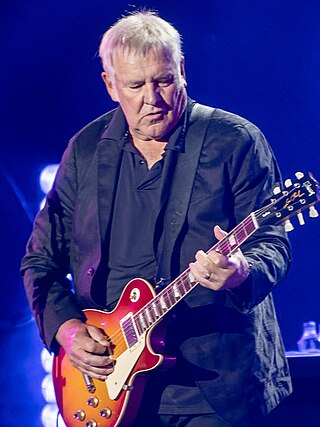
Aleksandar Živojinović, known professionally as Alex Lifeson, is a Canadian musician, best known as the guitarist for the rock band Rush. In 1968, Lifeson co-founded a band that would later become Rush, with drummer John Rutsey and bassist and lead vocalist Jeff Jones. Jones was replaced by Geddy Lee a month later, and Rutsey was replaced by Neil Peart in 1974, after which the lineup remained unchanged until the band's dissolution in 2018. Lifeson was the only member of Rush who stayed in the band throughout its entire existence, and he and Lee were the only members to appear on all of the band's albums.

Rush was a Canadian rock band that primarily comprised Geddy Lee, Alex Lifeson (guitar) and Neil Peart. The band formed in Toronto in 1968 with Lifeson, drummer John Rutsey, and bassist and vocalist Jeff Jones, whom Lee immediately replaced. After Lee joined, the band went through several line-up changes before arriving at its classic power trio line-up with the addition of Peart in July 1974, who replaced Rutsey four months after the release of their self-titled debut album; this line-up remained intact for the remainder of the band's career.

Fly by Night is the second studio album by the Canadian rock band Rush, released on February 14, 1975, by Mercury Records. It was the first Rush album to showcase elements of progressive rock for which the band has become known. It was also the first to feature lyricist and drummer Neil Peart, who replaced original drummer John Rutsey the previous summer just prior to the band's first North American tour. Peart took over as Rush's primary lyricist, and the abundance of fantastical and philosophical themes in his compositions contrasted greatly with the simpler hard rock of the band's debut album.
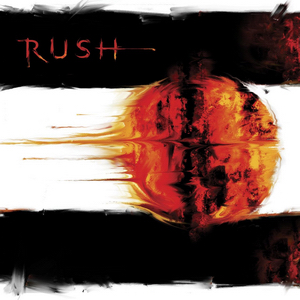
Vapor Trails is the seventeenth studio album by Canadian rock band Rush. It was released on May 14, 2002, on Anthem Records, and was their first studio release since Test for Echo (1996), the longest gap between two Rush albums. After the Test For Echo tour finished in July 1997, drummer and lyricist Neil Peart suffered the loss of his daughter and then his wife in separate tragedies. As a result, the group entered an extended hiatus during which it was not certain they would continue. They eventually reunited in January 2001 to rehearse material for a new album, recording for which lasted until December. For the first and only time since Caress of Steel (1975), the group did not use any keyboards or synthesizers in their music, incorporating many layers of guitar, bass and drums instead.

Permanent Waves is the seventh studio album by Canadian rock band Rush, released on January 14, 1980, through Anthem Records. After touring to support their previous album, Hemispheres (1978), the band began working on new material for a follow-up in July 1979. This material showed a shift in the group's sound towards more concise arrangements and radio-friendly songs, though their progressive rock blueprint is still evident on "Jacob's Ladder" and the nine-minute closer "Natural Science." Bassist/vocalist Geddy Lee also employed a more restrained vocal delivery compared to previous albums. Permanent Waves was first of seven studio albums that the band recorded at Le Studio in Morin-Heights, Quebec with production handled by the group and Terry Brown.

Rush in Rio is a three-disc live album by Canadian band Rush, released on October 21, 2003. The album is also available as a two DVD set. With the exception of the last two tracks on the third disc, the album was recorded at Maracanã Stadium in Rio de Janeiro on the final night of the Vapor Trails Tour. The other two tracks were taken from previous shows on the same tour. "Between Sun & Moon" was recorded at the Cricket Wireless Pavilion, Phoenix, Arizona, on September 27, 2002, and "Vital Signs" was recorded at the Colisée Pepsi, Quebec City, Quebec, on October 19, 2002.

Counterparts is the fifteenth studio album by Canadian rock band Rush, released October 19, 1993, on Anthem Records. After the band finished touring its previous album Roll the Bones (1991) in mid-1992, the members took a break before starting work on a follow-up.
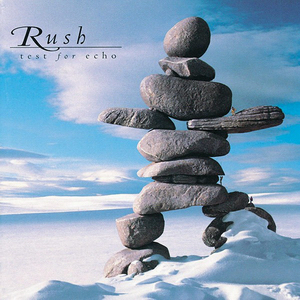
Test for Echo is the sixteenth studio album by the Canadian rock band Rush, released on September 10, 1996, by Anthem Records. It was the final Rush album to be co-produced by Peter Collins. The band supported the album with a world tour in 1996 and 1997, after which they went on a five-year hiatus following the deaths of drummer Neil Peart's daughter and wife, and would not record again until 2001.

Different Stages is a live album by Canadian rock band Rush, released in 1998. The bulk of the first and second discs were recorded at the World Music Theatre in Tinley Park, Illinois, during the 1997 Test for Echo tour. Five other songs from various stops along the tour were included and three songs from the 1994 Counterparts tour. The third disc is taken from a performance at the Hammersmith Odeon in London during the A Farewell to Kings tour in 1978.

The Spirit of Radio: Greatest Hits 1974–1987 is a compilation album by Canadian rock band Rush, released on February 11, 2003. It includes many of the band's most popular songs from their Mercury Records era, but does not feature any material from their third album Caress of Steel. A special edition of the album included a DVD containing music videos for several songs, including "Mystic Rhythms".
"Xanadu" is a song by the Canadian progressive rock band Rush from their 1977 album A Farewell to Kings. It is approximately eleven minutes long, beginning with a five-minute-long instrumental section before transitioning to a narrative written by Neil Peart, which in turn was inspired by the Samuel Taylor Coleridge poem Kubla Khan.

Snakes & Arrows is the eighteenth studio album by Canadian rock band Rush, released on May 1, 2007, by Anthem Records. After their R30: 30th Anniversary Tour ended in October 2004 the band took a one-year break, during which they agreed to start work on a follow-up in January 2006. The album was recorded in five weeks with co-producer Nick Raskulinecz, a fan of the group who was praised by each member for his approach and technique. It contains three instrumental tracks, the most on any Rush album.
Malignant Narcissism is an instrumental track from Rush's 2007 album Snakes & Arrows. "Malignant Narcissism" was nominated for a 2008 Grammy under the category of Best Rock Instrumental Performance, Rush's fifth nomination in said category. However, the song lost to Bruce Springsteen's "Once Upon a Time in the West" making it their fifth defeat in that category.

Snakes & Arrows Live is a live double CD and DVD by Canadian band Rush. The CD was released on April 14, 2008, in the UK and on April 15, 2008, around the world. It was also released on DVD and Blu-ray on November 24, 2008. The material was taken from two performances during the first leg of the Snakes & Arrows Tour, recorded at the Ahoy Arena in Rotterdam, Netherlands on October 16 and 17, 2007. The album features nine of its 27 tracks drawn from Snakes & Arrows.
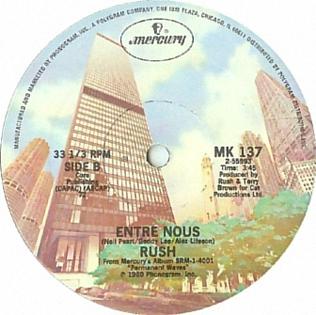
"Entre Nous" is the fourth track on the 1980 album Permanent Waves by progressive rock band Rush. It was also released as a single. The song appeared on the concert album Snakes & Arrows Live, released on April 15, 2008.

Retrospective III: 1989–2008 is a compilation album by Canadian rock band Rush released on March 3, 2009. The album is a collection of songs from the third and fourth decades of the band (1989–2008), which they spent signed to Atlantic Records. The album is available in two versions. The 2-disc version includes a DVD of music and live videos.
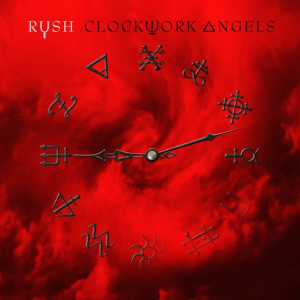
Clockwork Angels is the nineteenth and final studio album by Canadian rock band Rush, released on June 8, 2012, on Roadrunner Records. During the band's year-and-a-half break following its Snakes & Arrows Tour, the group decided to write a new studio album. Most of the album was recorded between October and December 2011 at Revolution Recording in Toronto, Ontario, Canada.

"Headlong Flight" is the second single from Canadian rock band Rush's 19th studio album, Clockwork Angels. It was released to radio stations and for online preview on April 19, 2012, and became available digitally and on disk April 24, 2012. A lyrics video was also made available on YouTube. In an interview with Rolling Stone, Geddy Lee commented on the song:
'Headlong Flight' was one of those songs that was a joy to write and record from beginning to end. Alex [Lifeson] and I had blast jamming in my home studio one day before the second leg of the Time Machine tour, and I did not revisit that jam until a year later. Alex and I assembled the song to be an instrumental and its original title was 'Take That Lampshade Off Yo Head!,' but once we saw the lyrics Neil [Peart] had written, I knew that the spirit of the lyrics matched the instrumental perfectly and it was just a matter of making them fit and writing the melodies.
References
- ↑ Peart, Neil. "The Game of Snakes and Arrows" (PDF). Archived from the original (PDF) on 2007-04-21. Retrieved 2009-07-23.
- ↑ Randall, Mark (June 2007). "Rock's Gold Standard: Alex Lifeson mixes vintage, acoustic, and modern sounds on Rush's latest album". Guitar One .
- ↑ "Songs for Tibet now available on iTunes". August 5, 2008. Retrieved 2009-07-23.